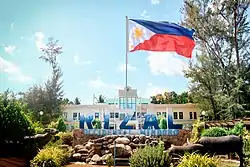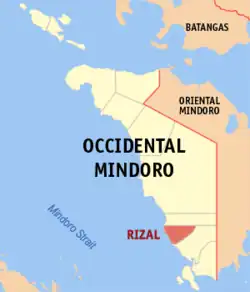Rizal | |
|---|---|
| Municipality of Rizal | |
 The facade of LGU-RIZAL Complex | |
 Flag | |
 Map of Occidental Mindoro with Rizal highlighted | |
OpenStreetMap | |
.svg.png.webp) Rizal Location within the Philippines | |
| Coordinates: 12°28′N 120°58′E / 12.47°N 120.97°E | |
| Country | Philippines |
| Region | Mimaropa |
| Province | Occidental Mindoro |
| District | Lone district |
| Founded | April 3, 1969 |
| Named for | José Rizal |
| Barangays | 11 (see Barangays) |
| Government | |
| • Type | Sangguniang Bayan |
| • Mayor | Ernesto C. Pablo Jr. |
| • Vice Mayor | Marcelino B. Dela Cruz |
| • Representative | Leody “Odie”F. Tarriela |
| • Electorate | 24,875 voters (2022) |
| Area | |
| • Total | 242.50 km2 (93.63 sq mi) |
| Elevation | 5.0 m (16.4 ft) |
| Highest elevation | 53 m (174 ft) |
| Lowest elevation | 0 m (0 ft) |
| Population (2020 census)[3] | |
| • Total | 40,429 |
| • Density | 170/km2 (430/sq mi) |
| • Households | 9,622 |
| Economy | |
| • Income class | 3rd municipal income class |
| • Poverty incidence | 21.29 |
| • Revenue | ₱ 174.5 million (2020) |
| • Assets | ₱ 346 million (2020) |
| • Expenditure | ₱ 164.6 million (2020) |
| • Liabilities | ₱ 110.3 million (2020) |
| Service provider | |
| • Electricity | Occidental Mindoro Electric Cooperative (OMECO) |
| Time zone | UTC+8 (PST) |
| ZIP code | 5103 |
| PSGC | |
| IDD : area code | +63 (0)43 |
| Native languages | Ratagnon Tagalog |
Rizal, officially the Municipality of Rizal (Tagalog: Bayan ng Rizal), is a 3rd class municipality in the province of Occidental Mindoro, Philippines. According to the 2020 census, it has a population of 40,429 people.[3]
Rizal is 153 kilometres (95 mi) from Mamburao.
History
Before the coming of the Spaniards to the Philippines, the area which comprises the municipality of Rizal at present, was covered with forests. Later on, a few families of tribal Filipinos, known as Ratagnons, settled near the mouth of a river which was called Bogsanga. According to the Hanunoos, another group of tribal Filipinos, living on the hills, about ten kilometers west of Bogsanga, the original name of the river was Bisanga, a word from their dialect which means "It branched out." They gave the river that name for the said body of water came from two sources.
Political leaders of San Jose and Occidental Mindoro felt that the barrios between Busuanga and Lumintao River should be created as another municipality. In anticipation of the creation of a new town, residents of Barrio Limlim decided to change the name of their community to Rizal. They expressed their desire that their barrio would be made as the center of the town.
When Pedro Medalla Sr. was elected in 1965 as representative of Occidental Mindoro, one of the bills he filed in Congress was the creation of the municipality of Rizal. Through his effort, Republic Act No. 5460 was passed by Congress and signed into law by President Ferdinand Marcos. Rizal became a municipality on April 3, 1969. Ten barrios composed the new town. They were Adela, Rumbang, Salvacion, Magui, Magsikap, San Pedro, Santo Nino, Pitogo, Aguas and Rizal (Limlim).
Geography
Barangays
Rizal is politically subdivided into 11 barangays. Each barangay consists of puroks and some have sitios.
- Adela
- Aguas
- Magsikap
- Malawaan
- Pitogo
- Rizal
- Rumbang
- Salvacion
- San Pedro
- Santo Niño
- Manoot
Climate
| Climate data for Rizal, Occidental Mindoro | |||||||||||||
|---|---|---|---|---|---|---|---|---|---|---|---|---|---|
| Month | Jan | Feb | Mar | Apr | May | Jun | Jul | Aug | Sep | Oct | Nov | Dec | Year |
| Mean daily maximum °C (°F) | 30 (86) |
31 (88) |
32 (90) |
32 (90) |
32 (90) |
31 (88) |
30 (86) |
29 (84) |
29 (84) |
29 (84) |
30 (86) |
30 (86) |
30 (87) |
| Mean daily minimum °C (°F) | 21 (70) |
21 (70) |
22 (72) |
22 (72) |
24 (75) |
25 (77) |
25 (77) |
25 (77) |
25 (77) |
24 (75) |
23 (73) |
22 (72) |
23 (74) |
| Average precipitation mm (inches) | 30 (1.2) |
26 (1.0) |
39 (1.5) |
58 (2.3) |
192 (7.6) |
283 (11.1) |
341 (13.4) |
323 (12.7) |
317 (12.5) |
231 (9.1) |
119 (4.7) |
56 (2.2) |
2,015 (79.3) |
| Average rainy days | 10.3 | 8.3 | 12.4 | 16.3 | 23.5 | 27.1 | 28.4 | 27.3 | 27.6 | 26.3 | 19.2 | 13.6 | 240.3 |
| Source: Meteoblue[5] | |||||||||||||
Demographics
| Year | Pop. | ±% p.a. |
|---|---|---|
| 1970 | 12,108 | — |
| 1975 | 14,938 | +4.30% |
| 1980 | 18,609 | +4.49% |
| 1990 | 23,379 | +2.31% |
| 1995 | 27,112 | +2.81% |
| 2000 | 29,785 | +2.04% |
| 2007 | 32,065 | +1.02% |
| 2010 | 34,458 | +2.65% |
| 2015 | 38,263 | +2.01% |
| 2020 | 40,429 | +1.09% |
| Source: Philippine Statistics Authority[6][7][8][9] | ||
Economy
References
- ↑ Municipality of Rizal | (DILG)
- ↑ "2015 Census of Population, Report No. 3 – Population, Land Area, and Population Density" (PDF). Philippine Statistics Authority. Quezon City, Philippines. August 2016. ISSN 0117-1453. Archived (PDF) from the original on May 25, 2021. Retrieved July 16, 2021.
- 1 2 Census of Population (2020). "Mimaropa". Total Population by Province, City, Municipality and Barangay. Philippine Statistics Authority. Retrieved 8 July 2021.
- ↑ "PSA Releases the 2018 Municipal and City Level Poverty Estimates". Philippine Statistics Authority. 15 December 2021. Retrieved 22 January 2022.
- ↑ "Rizal: Average Temperatures and Rainfall". Meteoblue. Retrieved 26 April 2020.
- ↑ Census of Population (2015). "Region IV-B (Mimaropa)". Total Population by Province, City, Municipality and Barangay. Philippine Statistics Authority. Retrieved 20 June 2016.
- ↑ Census of Population and Housing (2010). "Region IV-B (Mimaropa)" (PDF). Total Population by Province, City, Municipality and Barangay. National Statistics Office. Retrieved 29 June 2016.
- ↑ Censuses of Population (1903–2007). "Region IV-B (Mimaropa)". Table 1. Population Enumerated in Various Censuses by Province/Highly Urbanized City: 1903 to 2007. National Statistics Office.
{{cite encyclopedia}}: CS1 maint: numeric names: authors list (link) - ↑ "Province of Occidental Mindoro". Municipality Population Data. Local Water Utilities Administration Research Division. Retrieved 17 December 2016.
- ↑ "Poverty incidence (PI):". Philippine Statistics Authority. Retrieved December 28, 2020.
- ↑ "Estimation of Local Poverty in the Philippines" (PDF). Philippine Statistics Authority. 29 November 2005.
- ↑ "2003 City and Municipal Level Poverty Estimates" (PDF). Philippine Statistics Authority. 23 March 2009.
- ↑ "City and Municipal Level Poverty Estimates; 2006 and 2009" (PDF). Philippine Statistics Authority. 3 August 2012.
- ↑ "2012 Municipal and City Level Poverty Estimates" (PDF). Philippine Statistics Authority. 31 May 2016.
- ↑ "Municipal and City Level Small Area Poverty Estimates; 2009, 2012 and 2015". Philippine Statistics Authority. 10 July 2019.
- ↑ "PSA Releases the 2018 Municipal and City Level Poverty Estimates". Philippine Statistics Authority. 15 December 2021. Retrieved 22 January 2022.